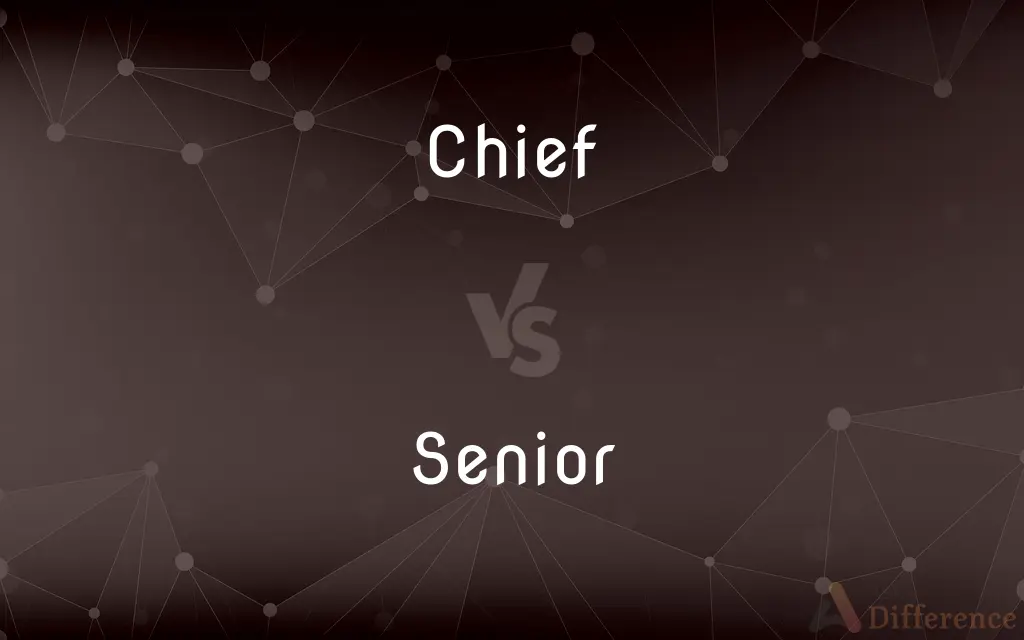Chief vs. Senior — What's the Difference?
By Fiza Rafique & Maham Liaqat — Updated on March 5, 2024
Chief signifies a top-ranking or leading position, emphasizing authority and leadership, while Senior denotes experience or long-standing status, highlighting precedence and expertise.

Difference Between Chief and Senior
Table of Contents
ADVERTISEMENT
Key Differences
Chief is used to denote a position of high rank or authority within an organization, often the top or leading role in a specific area, such as Chief Executive Officer (CEO) or Chief Financial Officer (CFO). This term emphasizes leadership, decision-making authority, and overall responsibility for a significant area of the organization's operations. Senior, on the other hand, indicates a level of hierarchy that signifies greater experience, expertise, or tenure within a company or professional setting, such as a Senior Analyst or Senior Engineer. While it conveys a status of precedence over others in similar roles, it does not necessarily imply the top-most position.
Chief positions are integral to setting strategic directions, establishing policies, and ensuring the achievement of organizational goals. They are typically found at the highest level of an organization's structure and play a critical role in its overall success. Senior positions, while also important, are more indicative of advanced skills, knowledge, and experience in a particular field or discipline. Seniors are often responsible for mentoring junior staff, leading projects, and contributing significantly to their department's objectives with their depth of knowledge.
The term chief is derived from the Old French "chef," meaning head or leader, which aligns with its use in modern contexts to denote leadership roles within organizations. Senior comes from the Latin "senior," meaning older or more experienced, which reflects its application in denoting individuals with a longer tenure or greater experience in their field.
Chiefs are expected to provide visionary leadership, make high-stakes decisions, and guide the organization towards its strategic goals. They are typically accountable to the board of directors or shareholders. Seniors, while they may have decision-making power within their scope of work, focus more on operational excellence, leveraging their experience to improve processes, mentor others, and deliver on specific projects or tasks.
Understanding the distinction between chief and senior is crucial for recognizing the different levels of responsibility, expertise, and leadership within an organization. Chiefs lead the organization or major parts of it, setting the course and ensuring alignment with long-term objectives, whereas seniors bring a wealth of experience and expertise to their roles, contributing to the organization's success through their specialized knowledge and skills.
ADVERTISEMENT
Comparison Chart
Definition
Denotes top-ranking or leading position
Indicates experience or long-standing status
Emphasis
Leadership and authority
Precedence and expertise
Organizational Role
Strategic decision-making, overall leadership
Operational excellence, mentoring
Examples
Chief Executive Officer (CEO), Chief Financial Officer (CFO)
Senior Analyst, Senior Engineer
Origin
Old French "chef," meaning head or leader
Latin "senior," meaning older or more experienced
Compare with Definitions
Chief
Embodies overall organizational leadership.
Chiefs are pivotal in shaping company culture.
Senior
More operational, focusing on specific areas.
Senior Analysts provide in-depth market analysis.
Chief
Accountable for the organization's success.
Chiefs report directly to the board of directors.
Senior
Signifies a level of precedence due to experience.
Senior Engineers develop and mentor junior staff.
Chief
Represents a leading or principal position.
The Chief Technology Officer oversees the tech strategy.
Senior
Involves guiding less experienced colleagues.
Her role as a senior manager includes mentoring new hires.
Chief
Holds ultimate decision-making power.
The Chief Financial Officer approved the new budget.
Senior
Highlights specialized knowledge or skills.
He is a senior consultant with expertise in cybersecurity.
Chief
Involves setting and achieving strategic goals.
The CEO led the company through a major turnaround.
Senior
Reflects a longer tenure or more experience.
Senior staff members often lead project teams.
Chief
A leader or ruler of a people or clan
Chief Banawi
The chief of the village
Senior
Of or for older or more experienced people
Senior citizens
Chief
One who is highest in rank or authority; a leader.
Senior
High or higher in rank or status
The people senior to me in my department
He is a senior Finance Ministry official
Chief
Highest in rank, authority, or office
The chief scientist in the lab.
Senior
A person who is a specified number of years older than someone else
She was only two years his senior
Chief
Highest in office or rank; principal; head.
Senior
Of or relating to the fourth and last year of high school or college
Our senior class.
Chief
A person who is in charge;
The head of the whole operation
Senior
Someone older than someone else (with possessive).
He was four years her senior.
Chief
A person who exercises control over workers;
If you want to leave early you have to ask the foreman
Senior
A person who is older than another; one more advanced in life.
Senior
Older; higher in rank; longer in length of tenure or service;
Senior officer
Common Curiosities
Is the term "chief" only used for executives?
Primarily, yes, it denotes leadership roles such as executives or department heads.
What is the difference between a chief and a senior position?
A chief position indicates a top-ranking or leadership role, while a senior position denotes experience or expertise in a specific area.
Can a senior position also be a leadership role?
Yes, senior positions often entail leadership within their area of expertise, though they may not be at the organization's highest level.
How does one become a senior in their field?
Through gaining extensive experience, expertise, and often a longer tenure in their professional area.
Do seniors have decision-making authority?
Seniors may have decision-making authority within their scope of work or projects but not necessarily at the strategic level like chiefs.
Is the role of a chief more stressful than that of a senior?
Given the higher level of responsibility and decision-making, chief roles can be more stressful, though senior roles also come with their pressures and expectations.
Do senior roles involve mentoring?
Yes, mentoring junior staff or less experienced colleagues is often a key part of senior roles.
Are chiefs responsible for the success of the entire organization?
Yes, chiefs are typically responsible for setting strategic directions and ensuring the organization's overall success.
How is success measured for chiefs vs. seniors?
For chiefs, success is measured by the organization's overall performance and strategic goal achievement. For seniors, it is often measured by operational excellence, project success, and contributions to their area of expertise.
Can a person be a "senior chief" in an organization?
The term "senior chief" might be used informally but is not a standard title; it would imply a high level of experience and leadership within the chief category.
Share Your Discovery

Previous Comparison
Rebound vs. Board
Next Comparison
Lover vs. FriendAuthor Spotlight
Written by
Fiza RafiqueFiza Rafique is a skilled content writer at AskDifference.com, where she meticulously refines and enhances written pieces. Drawing from her vast editorial expertise, Fiza ensures clarity, accuracy, and precision in every article. Passionate about language, she continually seeks to elevate the quality of content for readers worldwide.
Co-written by
Maham Liaqat














































